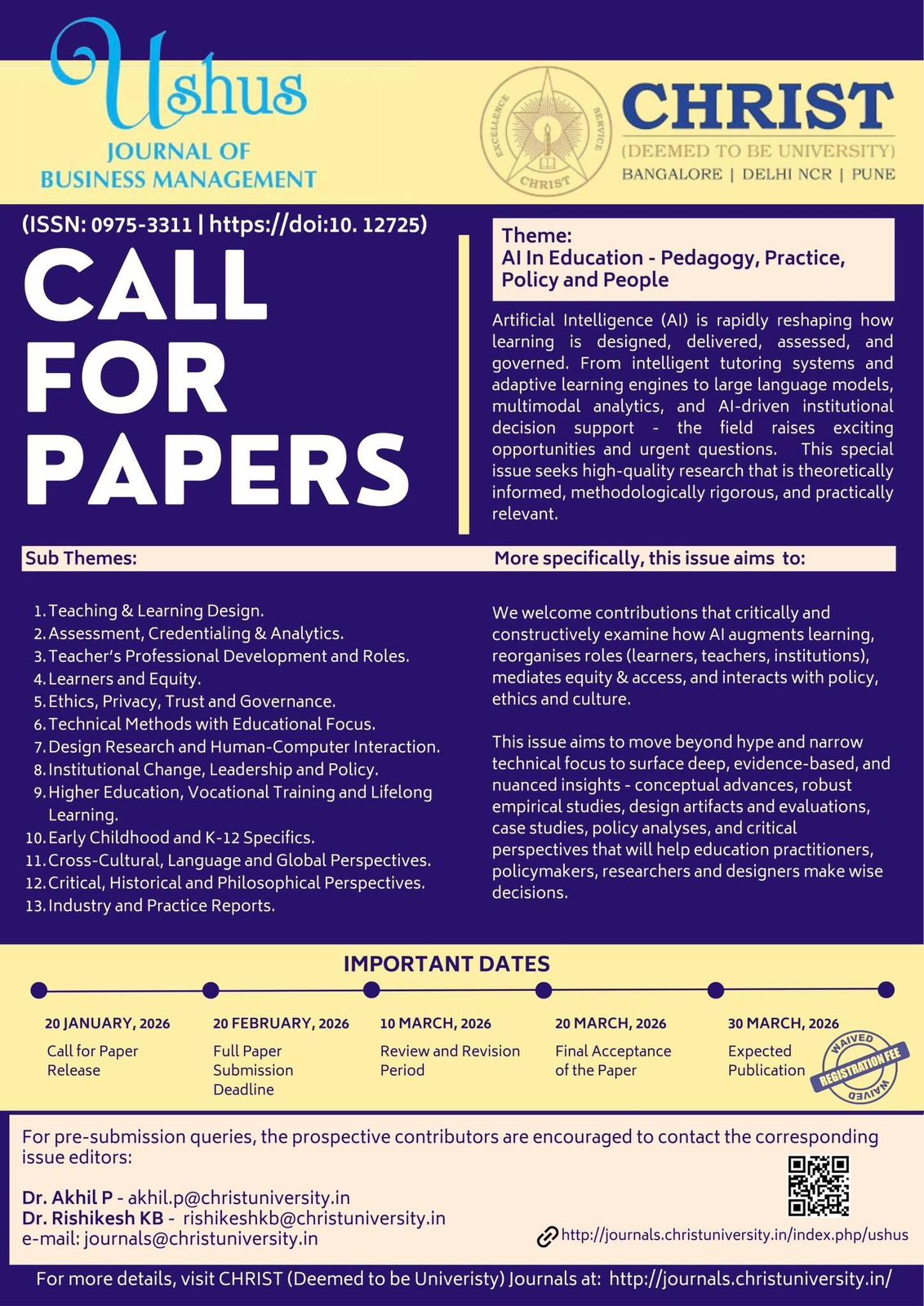Quantification of Human Resources: A Systematic Review of HR Accounting in India
DOI:
https://doi.org/10.12725/ujbm.63.4Keywords:
Human resource accounting, Human resource valuation, Indian companies, Organizational behavior implications, Systematic reviewAbstract
Human Resources Accounting (HRA) is the process through which human resources of an organization are measured and valued. The present study is a systematic review of the current status and significance of HRA in Indian companies as well as exploring the influencing factors of HRA. The study helps to identify research gaps which can help in framing objectives for future research. The review can be beneficial to decision-makers of Indian companies to direct further implementation of HRA based on existing limitations and challenges. Furthermore, the findings related to the impact of HRA can inspire organizations to amplify the implementation of HRA practices. The findings can also be a reference for behavioural scientists and management researchers in advancing interdisciplinary research in human resources accounting.
References
Agarwal, R. (2004). Human resource accounting practices in Indian companies. Published thesis. Aligarh Muslim University.
Alekhya, P., Lakshmi, P. V. (2020). Impact of Human Resource Accounting on Companies Profitability. Test Engineering and Management, 83, 16048-16055.
American Accounting Association, (1974). Report of the Committee on Accounting for Human Resources. The Accounting Review, Supplement to Volume XLIX, 115-124.
Aggarwal, K., & Verma, A. (2020). Effect of Company Characteristics on Human Resource Disclosure Index: Empirical Evidences from Indian Corporates. Management and Labour Studies, 45(1), 85-117.
Batra, G. S. (1996). Human resource auditing as a tool of human resource valuation: interface and emerging practices. Managerial Auditing Journal, 11(8), 23-30.
Birnberg, J., & Nath, R. (1967). Implications of Behavioural Science for Managerial Accounting. The Accounting Review, 42(3), 468-479. Retrieved March 25, 2021, from http://www.jstor.org/stable/243712
Bullen, M. L., & Eyler, K. A. (2010). Human resource accounting and international developments: implications for measurement of human capital. Journal of International Business and Cultural Studies, 3, 1.
Bullen, M. L., & Eyler, K. A. (2010). Human resource accounting and international developments: implications for measurement of human capital. Journal of International Business and Cultural Studies, 3, 1.
Bullen, M.L. (2007). Human resource accounting: A useful tool for measurement and management in organizations. Leadership and Organizational Management Journal. 85-103.
Burke, L. A., Hsieh, C. (2006). Operationalizing the strategic net benefit (SNB) of HR. Journal of Human Resource Costing & Accounting, 9(1), 26-39. 1401-338X D
Chand, M., & Lal, H. (2008). Human resource accounting: An implication for managerial decisions in Indian hotel industry. International Journal of Hospitality and Tourism Systems, 1(1), 107.
Chaturvedi, A. (2013). Human Resource Accounting and Its Effect on Organizational Growth:(A Case Study of Steel Authority of India Ltd.). Research Analysis and Evaluation, ISSN, 0975-3486.
Chouhan, V., & Naghshbandi, N. (2015). Measuring employees value: A critical study on human resources accounting in India. International Journal of Management, Accounting and Economics, 2(4), 277-292.
Das, S. C. (2013). Corporate social reporting and human resource disclosures: experiences from insurance companies in India. Social Responsibility Journal.
Das, P.K. (2018). Human Resource Accounting in India. Advances in Economics and Business Management, 5(5), 343-349.
Enyi, E. P., & Akindehinde, A. O. (2014). Human resource accounting and decision making in post-industrial economy. International Journal, 2(1), 19-35.
Flamholtz, E. G., Bullen, M. L., & Hua, W. (2002). Human resource accounting: A historical perspective and polisett future implications. Management Decision, 40(10), 947-954. http://dx.doi.org/10.1108/00251740210452818
Fleming, M.M.K. (1977), Behavioural implications of human resource accounting: A survey of potential problems. Hum. Resour. Manage., 16: 24-29. https://doi.org/10.1002/hrm.3930160205
GARG, J. P. (2017). A comparative study of human resource disclosure and reporting practices of selected public and private sector banks in india. CLEAR International Journal of Research in Commerce & Management, 8(11).
Gupta, S. R. (2018). A comparative study of human resource accounting disclosure practices in Indian companies. RESEARCH REVIEW International Journal of Multidisciplinary, 3(12), 1408-1413.
Hendricks, J. (1976). The Impact of Human Resource Accounting Information on Stock Investment Decisions: An Empirical Study. The Accounting Review, 51(2), 292-305. http://www.jstor.org/stable/244840
Hossain, M., Islam, M., & Bhuiyan, M. (2015). Recognition, Measurement and Accounting Treatment of Human Resource Accounting. Rofiqul and Bhuiyan, Majedul, Recognition, Measurement and Accounting Treatment of Human Resource Accounting (November 17, 2015).
HR, M. S., Sinha, R. (2017). Comparative Analysis of Corporate Performance of the selected HRA and Non-HRA Cement Companies in India, 6(10), 31-37. https://doi.org/10.1108/02686909610131657
Indradevi, R., & Gomathi, S. (2008). Perception of Employees on Human Capital Valuation with Special Reference to Software Industries. Management and Labour Studies, 33(3), 338-353.
Kalpana, V. (2016). Human Resource Accounting in Indian Companies–Importance and Challenges. International Journal of Scientific Engineering and Research (IJSER), 4(5), 15-18.
Kanade, S.V., Harwani, S. (2018). Human Resource Accounting – An employee perspective. International Journal in Management and Social Science, 6(1), 78-87.
Kansal, M., & Joshi, M. (2015). Reporting human resources in annual reports. Asian Review of Accounting, 23(3), 256-274. http://dx.doi.org/10.1108/ARA-04-2014-0051
Kashive, N. (2013). Importance of human resource accounting practices and implications of measuring value of human capital: Case study of successful PSUs in India. XIMB journal of Case research, 4(02), 113-143.
Kaur, S., Raman, A. V., & Singhania, M. (2014). Human resource accounting disclosure practices in Indian companies. Vision, 18(3), 217-235.
Kaur, S., Raman, V. A., & Singhania, M. (2016). Impact of corporate characteristics on human resource disclosures. Asian Review of Accounting.
Maharjan, M. P., & Sekiguchi, T. (2017). Human resource management practices of Japanese companies in India: dealing with the transfer-adaptation dichotomy. Journal of Asia Business Studies.
Mathapati, C. (2018). Review and reflections on human resource accounting -indian perspective. 6. 669-672.
Pandey, N. N. (2012). Human Resources: Its Valuation and Disclosure Practices in Nifty-based Companies of India. Management and Labour Studies, 37(4), 323-335.
Pandurangarao, D., Basha, D. S., & Rajasekhar, D. E. V. A. R. A. P. A. L. L. I. (2013). A study on human resource accounting methods and practices in India. International journal of social science and interdisciplinary research, 2(4), 95-102.
Phillip G. Buchanan & Le Thi Cao (1986) The Integration of Behavioral Accounting in Undergraduate Accounting Curricula, Journal of Education for Business, 61:7, 297-302, DOI: 10.1080/08832323.1986.10772732
Polisetty, A., & Sheela, P. (2015). Human Resource Accounting-A Case Study with Special Reference to Visakhapatnam Port Trust. International Journal of Engineering and Management Research (IJEMR), 5(2), 72-77.
Prajapati, M., Singh, R., & Vahoniya, D. (2016). A Study on Conceptual Framework of Human Resource Accounting in India. International Journal of Human Resource Management and Research (IJHRMR), 6(3), 7-12.
Prasad, M., & Patel, P. (2011). Human resources accounting practices in Indian banking: An exploratory study. HRD Journal, 2(1), 106-112.
Raju, K. K. (2014). Utility and criticisms of human resource accounting. Indian accounting association past presidents, 46, 93.
Rani, A. (2016). A Literature Review on Human Resource Accounting. International Journal of Informative & Futuristic Research, 3(6), 1867-1876.
Rani, N., & Singla, J. (2015). Auditing Human Resource Functions & Competencies: An Empirical Study. Indian Journal of Industrial Relations, 51(1), 109-120. http://www.jstor.org/stable/43974542
Ratti, M. (2012). Human Resource Accounting Practices in Indian Industries. Management Prudence, 3(1), 55-60. https://lavasalibrary.remotexs.in/scholarly-journals/human-resource-accounting-practices-indian/docview/1478038632/se-2?accountid=38885
Salati, A. Y. (2015). An insight into human resource accounting models–need to measure human resource as a valuable asset. Advance and Innovative Research, 77.
Samartha, V., Rajesha, T. M., Hawaldar, I. T., & Souza, L. J. D. (2019). Application of Lev and Schwartz Compensation Model on The Accounting Practices of MCF Limited. International Journal of Scientific & Technology Research, 8(8), 356-360.
Sasirekha, A. (2011). Innovative model for Assessing Human Assets. Journal of Contemporary Research in Management, 6(1), 27.
Sen, T. K. (2016). Impact of Intellectual Capital on the financial performance of Indian Public Sector Bank: With a Special reference of Bank of Baroda. International Journal of Innovative Research in Technology, 2(8), 8-14.
Seth, N. (2009). Human Resource Accounting Practices Adopted in Indian Industries. ASBM Journal of Management, 2(2), 103-113. https://lavasalibrary.remotexs.in/scholarly-journals/human-resource-accounting-practices-adopted/docview/503505969/se-2?accountid=38885
Sharma, D., Khatik, R. K. (2017). Human resource accounting disclosures practices in indian companies. Amity journal of management, 1(2), 41-48.
Shukuhian, H. (2018). Human Resource Accounting Policies and Practices in Public Sector Enterprises (Doctoral dissertation), Aligarh Muslim University.
Shukuhian, H., & Ashraf, S. H. (2019). Comparative analysis of human resource accounting practices and the effect of financial performance on human resource value in public sector companies in India. Business and Management, 11(3).
Sirisetti, S., & Mallesu, H. (2012). Human Resource Accounting Model in Indian Industries. The Journal of Commerce, 4(2), 48.
Sivaprakkash, S., Joseph, T. (2016). Human resource accounting-is it really accounted by the companies in India. International Journal of Recent Research Review, 1(5), 51-55
Sood, A. (2016). Role of Human Resource Accounting in India. International Journal of Advanced, 1(2), 33-40.
Tiwari, B. K. (2012). Human resource accounting in India: An overview. International Journal of Management Prudence, 4(2), 121.
Theeke, H. A. (2005). A human resource accounting transmission: shifting from failure to a future. Journal of Human Resource Costing & Accounting.
Tomassini, L. (1977). Assessing the Impact of Human Resource Accounting: An Experimental Study of Managerial Decision Preferences. The Accounting Review, 52(4), 904-914. http://www.jstor.org/stable/245588
Vohra, p., & Chaudhary, v. Human resource accounting practices leads firm performance. International Journal of Business and General Management (IJBGM) ISSN(P): 2319-2267
Downloads
Published
How to Cite
Issue
Section
License
Copyright (c) 2023 Parvathy Viswanath

This work is licensed under a Creative Commons Attribution-NonCommercial-NoDerivatives 4.0 International License.



